Career Planning
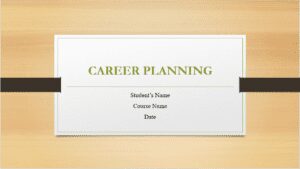
Hello, and welcome to this presentation about Career Planning. This presentation is designed to help young adults who are seeking to be entrepreneurs as well as the youth who are looking forward to working after high school graduation. The presentation will look into the career development models by Donald Super and John Holland and decide which is preferable for young adults. After that, the selected theory will be used for developing a career plan for young adults.
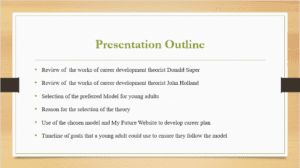
We will start by understanding the two schools of thought behind career development, specifically by Donald Super and John Holland. Based on the two models, we shall select the most preferred theory for young adults. This theory will be used to develop a career plan for young adults who are seeking to be entrepreneurs and those who will work after high school graduation. To follow the model, a timeline of goals will be set.
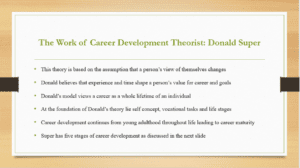
According to Kosine & Lewis (2008), the works of Donald Super and his colleagues show a dynamic process of career development, changing the focus of the career choice from a viewpoint of a static state to an emotional state. The theory posits that the development of a career is unique to every individual and that aspects such as geography, family, socioeconomic status, personality, ability, ethnicity, and gender, as well as the opportunity for everyone to varying levels, play a crucial role in the career path of an individual (Whiteley & Resnikoff (1972). Most importantly, career development is a continuous process and not static.
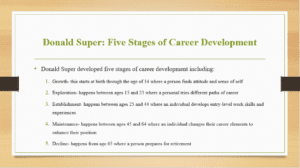
During the growth stage that starts from birth to age 14, an individual begins to develop their attitude and their sense of self toward work. In the exploration phase, an individual explores various career paths in their actual results, hobbies, and classes. The establishment stage entails a degree from age 25 to 44 where an individual starts to develop entry-level skills of job and work experience. In the maintenance phase, from the age of 45, an individual changes their career elements to enhance their position. Decline is a phase that often starts from the age of 65, when an individual minimizes their workload and starts preparing for retirement.
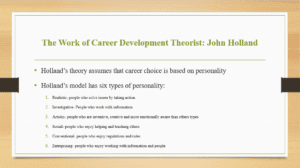
According to Holland’s school of thought, the choice of a career depends on the personality of the individual. He believes that people who have a realistic personality are doers and not just thinkers (Whiteley & Resnikoff, 1972). They are therefore attracted to work careers that need strength and skill, such as personal trainers, chefs, and carpenters. Investigative/thinkers personalities like to work by themselves to get information, such as doctors, lawyers, and actuaries (Kosine & Lewis, 2008). Artistic/creator personalities are people who are inventive and work both independently and with people. They include musicians, writers, and graphic designers. Social personalities work with others and love creating relationships with human resources professionals, counselors, and teachers. Conventional or organizing personalities like putting a value on money and status and dislike unstructured and unclear work. They may, therefore, choose careers such as COOs, economists, and personal financial planners. Enterprising or persuader personalities entail people who enjoy working with information and people and value security and status. These people often take careers that match their personalities, including salespersons, stockbrokers, and entrepreneurs.
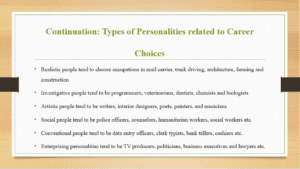
According to Johnson (2016), realistic people are adventurous, practical, and active and use tools, machines, and their hands to work, thus the choice of careers listed. Investigative personalities often explore, think, and analyze and are very likely to choose jobs such as biology and programming. Artistic characters are more expressive, emotional, and creative, thus express themselves through jobs like writing, interior design, and musicians. Social people often empathize, support, educate, and train others and therefore engage in social work activities. Conventional people feel more aligned with routines and rules and are likely to pursue careers with similar characteristics, such as banking and cashier roles. Lastly, enterprising people are verbally skilled and like to lead and direct as well as persuade others. They, therefore, take up occupations like lawyers, politicians, business executives, and TV producers (Johnson, 2016).
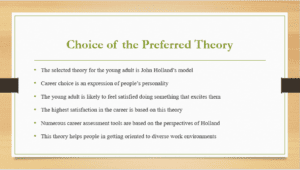
The selected theory for the young adult is John Holland’s model. This theory is chosen because young adults are still trying to find their foot in their careers, and the best way is to get them oriented with the varied work environment. Besides, according to Johnson (2016), the advantage of Holland’s theory is that it assists people in getting introduced to diverse work environments. Johnson (2016) believes that the highest career satisfaction is gained in the presence of congruence between the person’s type and that of their occupation. Therefore, young adult is likely to work wholeheartedly in a career that they can identify with. Moreover, this theory suggests that career choice shows an individual’s personality. Thus, a young adult is likely to choose a career that would reflect who they are as a person.
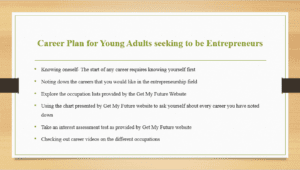
According to GetMyFuture (2021), the best manner when it comes to career decision-making is to understand themselves better first. Every person has a developmental hierarchy that is estimated by their coded scores of interest inventory that impel them toward one out of the occupational environments that Holland states (Johnson, 2016). Holland’s theory adds that the hierarchies are mediated by occupational and self-knowledge. Therefore, exploring the various occupation lists that the GetMyFuture website provides, the young adult is exposed to multiple occupations available for the entrepreneurial field as well as the self-assessment tests to help them discover their connections and interests with the alternatives. Moreover, watching videos on entrepreneurship also exposes them to their interests as they learn about themselves and what they like.
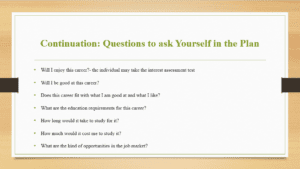
Evaluating oneself is important because it helps the individual identify with their personality before stepping into entrepreneurship. Young adults can find this out by taking an interest assessment test that the GetMyFuture website provides to learn about the careers that interest them. According to GetMyFuture (2021), an individual can download the skills checklist or the occupation profile that has the skills section to identify their skills. For instance, an individual may find out that they are good at persuading people to give money to a course. This may compel the individual to relate to being a salesperson or a fundraiser person for a business, as Johnson (2016) describes the personality. In addition, to know if the career choice fits with what the person likes or is good at, GetMyFuture (2021) suggests that the person views the occupation description, career video, and work and tasks activities on the occupation profile. The education requirement for every occupation is also provided on the website, inclusive of the education required at entry level, the typical education as well, and the local training programs in every area. In this platform, the young adult will also get an outlook on the employment platform, local job openings, and how much money similar positions earn.
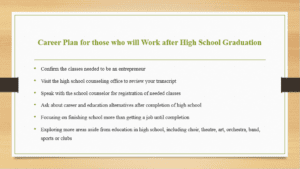
For high school students who are looking into exploring entrepreneurship after graduation, individuals need to focus on school work more than thinking about how to start a job. This will give them enough time to familiarize themselves with what their interests are. Moreover, they can explore other areas if they feel unsuccessful in class. For instance, they can get motivated in clubs, orchestra, band, choir, sports, theatre, or art to polish and develop their talents (GetMyFuture, 2021). More importantly, prior to graduation, they can seek career advice from the counseling department and ask questions regarding their careers of interest.
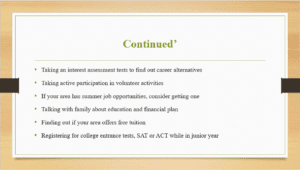
To prepare to be an entrepreneur, the youth awaiting high school graduation can take the interest assessment test to get to know themselves better and what they like. In the area that interests them, in this case, entrepreneurship, the youth can volunteer in any activity in their area to learn and develop new skills and also to contribute to their community (GetMyFuture, 2021). Many regions have summer jobs for high school students, and this can be a great opportunity for the youth to earn and save money for either a business plan or getting into college if that is the path they would like to pursue. Moreover, they would need counseling and guidance from their parents or guardians regarding education and career. Some of them can look for the free tuition offered in their areas and engage in many activities such as clubs, sports, theatre, and music to boost their college entrance tests.
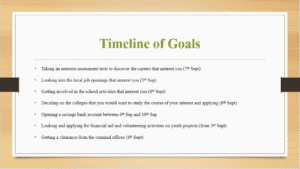
The young adult can start by looking into the various opportunities that their current educational institution offers. GetMyFuture (2021) has provided interest assessment tests that young adults can sign up for and take to discover more about themselves, what they like, and the careers that they would like to pursue. Moreover, many areas have jobs for the youth. Therefore, young adults can apply for them and even participate in volunteer activities and summer jobs. Exploring their career interests would also help them find out the universities in which they are offered and can apply. As Holland suggests, the individual’s personality will automatically drive them into taking careers that they can relate to and be satisfied pursuing.
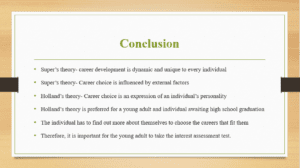
In conclusion, Super’s theory attests that career development is dynamic and goes through several stages, including Growth, Exploration, Establishment, Maintenance, and Decline. Holland’s theory assumes that the personality of an individual is reflected in their choice of career. He highlights the different characters as realistic, investigative, artistic, social, conventional, and enterprising. These personalities impel them into choosing jobs that match their specific characters. This is why GetMyFuture advises its users to take interest assessment tests to explore more about themselves, their interests, and skills that would suit their career choice.
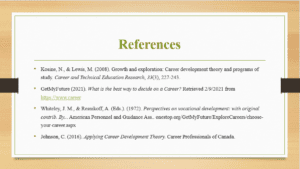
Kosine, N., & Lewis, M. (2008). Growth and exploration: Career development theory and programs of study. Career and Technical Education Research, 33(3), 227-243.
GetMyFuture (2021). What is the best way to decide on a Career? Retrieved 2/9/2021 from https://www.career
Whiteley, J. M., & Resnikoff, A. (Eds.). (1972). Perspectives on vocational development: with original contrib. By... American Personnel and Guidance Ass.. onestop.org/GetMyFuture/ExploreCareers/choose-your-career.aspx
Johnson, C. (2016). Applying Career Development Theory. Career Professionals of Canada.
ORDER A PLAGIARISM-FREE PAPER HERE
We’ll write everything from scratch
Question 
You are a Career Counselor working with Young Adults. Develop a PowerPoint presentation to assist this population in career development. Include the following:
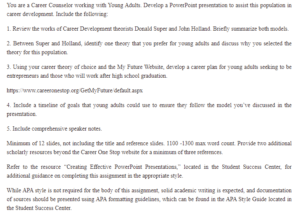
Career Planning
1. Review the works of Career Development theorists Donald Super and John Holland. Briefly summarize both models.
2. Between Super and Holland, identify one theory that you prefer for young adults and discuss why you selected the theory for this population.
3. Using your career theory of choice and the My Future Website, develop a career plan for young adults seeking to be entrepreneurs and those who will work after high school graduation.
https://www.careeronestop.org/GetMyFuture/default.aspx
4. Include a timeline of goals that young adults could use to ensure they follow the model you’ve discussed in the presentation.
5. Include comprehensive speaker notes.
Minimum of 12 slides, not including the title and reference slides. 1100 -1300 max word count. Provide two additional scholarly resources beyond the Career One Stop website for a minimum of three references.
Refer to the resource “Creating Effective PowerPoint Presentations,” located in the Student Success Center, for additional guidance on completing this assignment in the appropriate style.
While APA style is not required for the body of this assignment, solid academic writing is expected, and documentation of sources should be presented using APA formatting guidelines, which can be found in the APA Style Guide located in the Student Success Center.